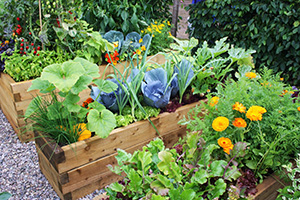Transform Your Kitchen Scraps into Nutrient-Rich Compost
Image: Cycreation / Adobestock

Don’t toss kitchen scraps and coffee grounds in the trash. By composting them, you’ll reduce landfill waste and enrich your garden soil. Follow these tips to create nutrient-rich compost for a thriving garden.
Get the Right Mix
Successful composting requires a balanced blend of green and brown materials. Greens—such as vegetable peelings, fruit scraps, and coffee grounds—provide nitrogen. Browns—such as dried leaves, straw, shredded paper, and wood chips—offer carbon. Strive for a 50-50 balance to ensure efficient decomposition.
Avoid Certain Materials
Refrain from adding meat, dairy, and oily foods, as they can attract pests and slow down composting. Similarly, don’t add pet waste and diseased plants, as they may contain harmful pathogens. Steer clear of any synthetic chemicals that can harm beneficial microorganisms.
Size Matters
Break down large food scraps and garden waste into smaller pieces before composting. This helps speed up the decomposition process, providing more surface area for microorganisms to work their magic.
Maintain Moisture
Keep your compost pile damp, like a wrung-out sponge. Regularly water the pile, especially in dry weather, to help break things down. However, avoid overwatering to prevent a waterlogged pile and potential odor issues.
Turn It Over
Aerate your compost pile by turning it with a pitchfork or compost aerator. This introduces oxygen, encouraging beneficial microorganisms and speeding up decomposition. Aim to turn the compost every one to two weeks or when the center feels warm.
Choose the Right Composting Method
Decide between using a compost bin or an open compost pile. Bins offer convenience, heat retention, and pest control. Open piles are more flexible in size but may require a bit more attention. Choose the option that suits your gardening needs and available space.
Be Patient
Composting takes time—it’s a natural process. Depending on various factors, your compost could be ready in a few months to a year. Trust the process and enjoy the rewards when your garden flourishes. |
